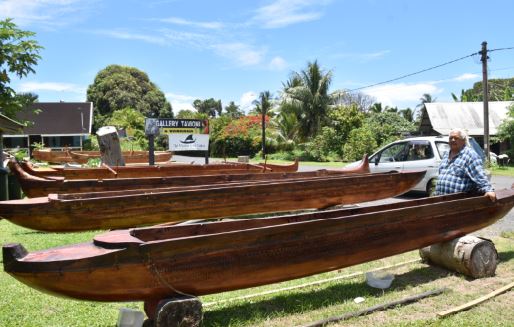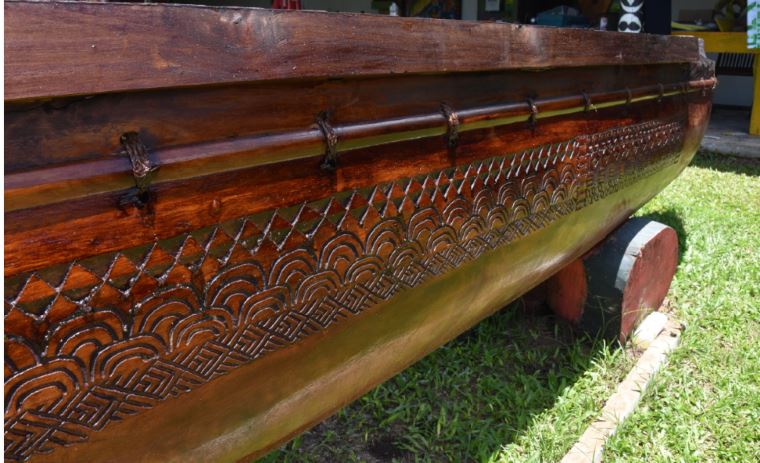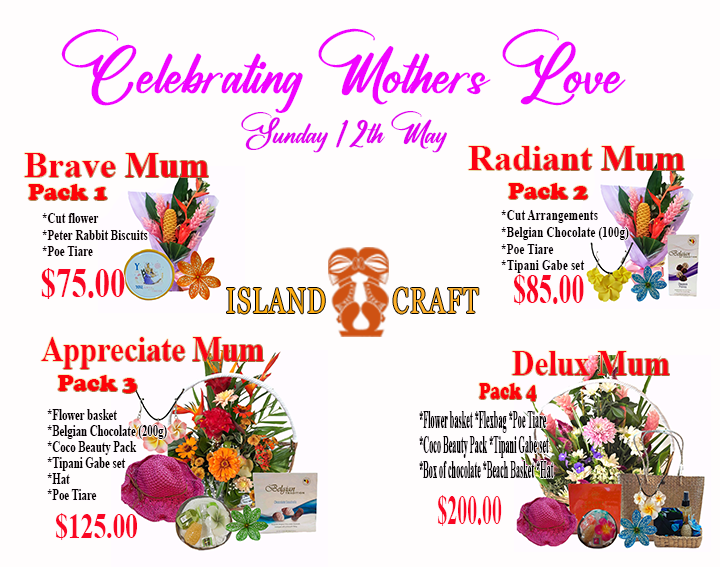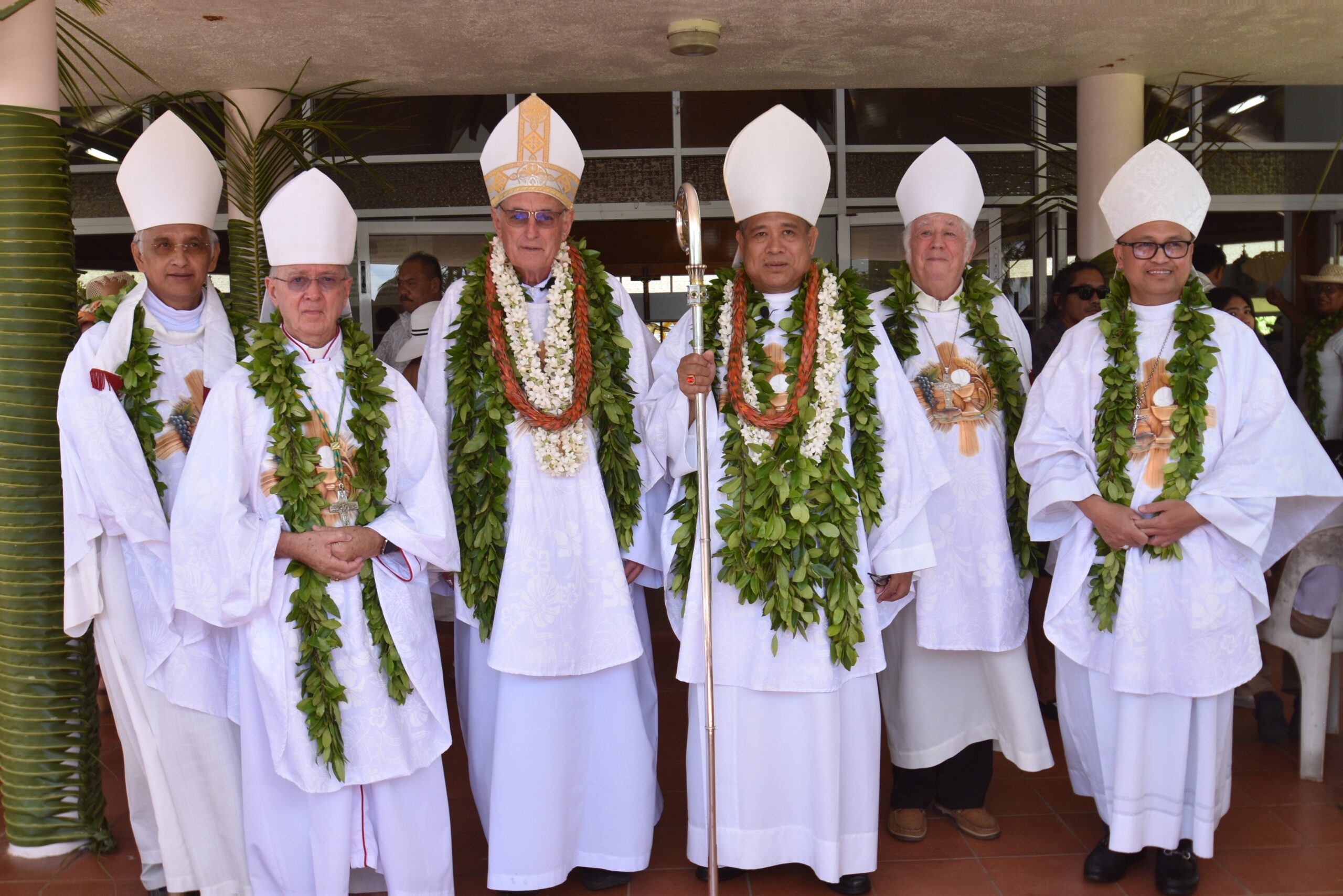Vaka project reaches halfway mark
Tuesday 24 January 2023 | Written by Melina Etches | Published in Culture, National

Artist and master carver Ta’unga Michael Tavioni BEM with the four completed traditional vaka. Picture: MELINA ETCHES/23012319
The art of building a canoe from tree logs is rarely seen, however, in a bid to revive the traditional practice, last September, Te Mana O Te Vaka boat building and sailing project was launched. Now the head of the project plans a traditional canoeing race and vaka fishing competition to bring his vision to life.
Four of the eight vaka have been completed, each vaka carved with striking designs, and are sitting grandly at the Gallery Tavioni and Vananga in Atupa.
Over 150 people have had a hand in the creation of the vaka – “whether it was three hours, three days, weeks or months”, says artist and master carver Ta’unga Michael Tavioni BEM, who is leading the project.
“I’m happy, I think we have achieved the teaching part, not making experts of these people but to the extent of making them aware of the art of making vaka,” said Tavioni.
“The four are completed, we just need to tie up the ama (outrigger) and they’re ready to go.”

Each vaka carved with striking designs are sitting grandly at the Gallery Tavioni and Vananga in Atupa. 23012320
Each vaka is carved from albesia wood, measure about 21 feet in length and can each carry three or four people.
Tavioni says the revival of the cultural aspects of Cook Islanders is imperative, “to fish and feed our people”, adding he would also like to see the reintroduction of the traditional moon phases of fishing and navigation methods.
With the launch of the completed vaka expected to take place in a few weeks, Tavioni is seeking funding and sponsors for a canoeing race from Avarua harbour to Avana and back, and for a traditional vaka fishing competition.
Tavioni said the canoeing race would be limited to only traditional vaka skills, sails and paddles, and for safety’s sake, escort boats would be needed.
There are five categories being considered for the fishing competition – fishing in the ocean for pelagic fish, spear fishing in the ocean, deep sea fishing for manga and vena, fishing at night for maroro (flying fish) and trawling.
“The idea is to demonstrate the use of the vaka to fish,” Tavioni said.
“And only traditional products would be allowed for fishing – hooks made out of bones, pearl shell and the wood (no metal).
“We need money for cash prizes to make it worthwhile, although the traditional fishermen are experts there is also the element of danger.”
A sponsor has offered thousands of dollars cash for the heaviest fish, but, only if the competition is to go ahead, he says.
Tavioni said the paddling/sailing event could be turned into an annual event like those in Maupiti, Tahiti.
Tavioni is steadfast that the proposed cultural vaka events “is what is needed for tourism”.
Hundreds of tourists visit his gallery in a week and share their stories of their holiday. “Here I meet them face to face they tell me things – the good and the bad.”
In sharing the highlights of their trip, tourists say “number one are the people and number two, the culture”.
“But people are the product of the culture, therefore what they really mean is, the culture is the most important thing.”
Tavioni says if there is no sponsorship for these events, the vaka will be handed over to the Cook Islands Voyaging Society shortly after the launch to educate people the art of sailing.
“These two events are national, it’s not mine, the outcome of the race would be for the benefit of the nation. I don’t really care if it doesn’t happen, but I would love to see it happen…”
The vaka project is to showcase Cook Islands culture and heritage and revitalise awareness of the importance of traditional life skills in a modern-day setting.
Using only natural material including wood, coconut husk fibre and pandanus leaves, the team have been hard at work, not only carving vaka but making sails paddles, bailers, sennit for rope, as well as fishing hooks, lines, and lures.
The project is a collaboration between the Cook Islands Voyaging Society (CIVS) and the Gallery Tavioni and Vananga.
Te Mana O te Vaka project is made possible with funding provided by the New Zealand Ministry of Foreign Affairs and Trade (MFAT), European Union, Government of Sweden as well as the University of the South Pacific (USP) with the Pacific European Union Marine Partnership programme.









































